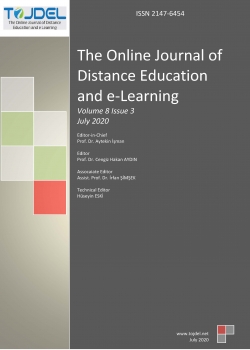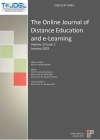TOJDEL - Volume 8 - Issue 3 - July 2020
 A STUDY ON PERCEPTION OF PERCEIVED EASE OF USE TOWARDS PERCEIVED USEFULNESS ON SMART EDUCATION
A STUDY ON PERCEPTION OF PERCEIVED EASE OF USE TOWARDS PERCEIVED USEFULNESS ON SMART EDUCATION Dinesh Elango, Chaiyot Kulcharatyothin
Abstract:
Internet of Things (IoT) has changed things over the decades. The education method has shown small improvement only in some areas. SMART education has been introduced. Some of the concepts of SMART education has been implemented in other forms. Thailand has introduced Thailand 4.0 policy, which includes the SMART city as a new engine growth of a nation. SMART education is a part of the SMART city. This paper is aiming to understand the perception of perceived ease of use towards perceived usefulness on SMART education. The Technology Adoption Model (TAM) has been used to measure the concept focusing on perceived ease of use and perceived usefulness. There are 424 respondents using convenience sampling and snowball methods. The research uses statistical software with the Pearson correlation, single linear regression, and multiple linear regressions to measure the result. All SMART components are perceived as useful except Resource Enriched. The strongest perceived usefulness is Technology Embedded (TE). The second and third strongest perceived usefulness is Adaptive (AE) and Motivate (ME). The least perceived usefulness is Self-directed (SE). The study can benefit the institute to focus on any part of SMART education components based on their focus by their priority in terms of implementation, development, and budget allocation for investment.
 ASSESSING KNOWLEDGE OF HEALTH EDUCATION COMPETENCIES VIA DISTANCE LEARNING ENVIRONMENT: A PILOT AND A NOVEL APPROACH AMONG UNDERGRADUATE STUDENTS AT A SOUTHERN UNIVERSITY IN THE UNITED STATES
ASSESSING KNOWLEDGE OF HEALTH EDUCATION COMPETENCIES VIA DISTANCE LEARNING ENVIRONMENT: A PILOT AND A NOVEL APPROACH AMONG UNDERGRADUATE STUDENTS AT A SOUTHERN UNIVERSITY IN THE UNITED STATES Amar Kanekar
Abstract:
The mission of the National commission for Health Education Credentialing (NCHEC) is to enhance the professional practice of health education professionals by promoting and sustaining a credentialed body of health education specialists. They set various areas of responsibilities for health education specialists to describe the profession more comprehensively and add clarity to their roles within and outside the profession. The purpose of this novel pilot study was to assess mastery of certain health education related competencies based on specific specific Areas of Responsibilities’ (Area I, Area II, Area III and Area IV) using a distance learning (100%) health program planning and evaluation online course. Results from data collected over two semesters demonstrated that there was a gain in knowledge in the Areas of Responsibilities’ mentioned above. There is an emerging need for additional studies which assess gain in content knowledge among entry-level health education specialists particularly using rigorous experimental designs. Health education and promotion curriculums across the nation need to strengthen health education competencies among health education specialists for providing improved health education practices.
 CHALLENGES OF USING ICT FOR INCLUSIVE EDUCATION IN NORTH EAST INDIA
CHALLENGES OF USING ICT FOR INCLUSIVE EDUCATION IN NORTH EAST INDIA Gitali Das
Abstract:
Inclusive education refers inclusion of all the students irrespective of their sex, race, colour, poverty, disability
and they have given equal opportunity in education and to be considered as being an integral part of the learning
community. Education is the fundamental right of a child and it is very important for the individual development
as well as the national development. We are the generation of 21st century which is known as the era of
technology. Now a days education is linked with the information and communication technology (ICT). But
India is still a developing country and the computer literacy rate of India is 6.5%. Therefore, it is very
challenging to provide education through ICT in an inclusive set up. In North East India, lack of technology,
internet access, and qualified trainers etc. are as the biggest challenges in providing ICT-based educational
services to the masses, especially to the marginalized group of people. Most important thing is that most of the
time it is very difficult to provide education for the students with special need with the help of ICT in a common
classroom along with the normal children. In this context, this paper will try to focus the challenges to provide
education through ICT in an inclusive classroom. For this study, the researcher has used to collect data from 80
samples and sample is collected with the help of simple random sampling and the result of the paper shows that
there are lots of barriers of using ICT for inclusive classroom in North East India.
 DEVELOPING A WEB-BASED ENVIRONMENT FOR LEARNING TO SOLVE PROBLEMS WITH THE LINUX COMMAND LINE: THE PROBLEM-POSING APPROACH
DEVELOPING A WEB-BASED ENVIRONMENT FOR LEARNING TO SOLVE PROBLEMS WITH THE LINUX COMMAND LINE: THE PROBLEM-POSING APPROACH C. Mihci, A.F. Satici
Abstract:
Computers are problem-solving tools at heart. Without an operating system though, they would be rendered
useless. Most computer users are unaware of the inherent capabilities of the bare OS and the problems it can
solve for them. This comes naturally in an era of commercialized solutions in the form of apps and software
packages. However, gaining understanding of the built-in functions of an OS hidden behind the graphical user
interface may let students discover new, personally relevant problems. In turn, attempts at formulating and
solving these could help students gain complex cognitive skills in IT. This study explores the notion of problemposing
and proposes a Web-based learning environment; where users may create guides and tutorials in addition
to posing their own educational problems pertaining to GNU/Linux Command Line use. Problems are stored in a
repository and may be rated, reviewed, discussed or solved by peers. A virtual environment running a Linux
distribution may be configured by users to accompany a posed problem and help create a complete sandbox
reflecting the problem’s story and structural elements.
 IMPACT OF CORONAVIRUS 2019 ON EDUCATIONAL INSTITUTIONS IN INDIA
IMPACT OF CORONAVIRUS 2019 ON EDUCATIONAL INSTITUTIONS IN INDIA Mala Goplani, Akash Gupta
Abstract:
Coronavirus Disease (COVID-19) is an infectious disease caused by new virus originated from China, which
affected around 200 countries in the world. The World Health Organization (WHO) has declared COVID-19 as
pandemic and most importantly the vaccine of which is not found till date. Since past few days had been very
crucial for India too, like other affected countries. Almost all states in India are threatened due to the speedy
spread of this dangerous disease which is life challenging. To prevent and eradicate the darkness caused by the
COVID-19, the Government of India has taken number of preventive measures including the closure of all
Educational institutions followed by one day nationwide Janta-curfew to combat virus and 21 days lockdown to
curb the coronavirus, etc. Showing the great concern towards students, Teachers and other stakeholders many
circulars/ notices/ letters have been issued by the relevant authoritative governing bodies like MHRD, UGC,
CBSE, etc. On the other hand, the lockdown period has caused some severe issues also such as breakdown in
regular lectures, postponement of exams, etc. which might cause the shortage of time during the next upcoming
academic year. Focusing on the various issues, The study highlights the Impact of COVID-19 on educational
institutions in India.
 QUALITY ASSURANCE IN DISTANCE EDUCATION: AN ISSUE NEEDS TO BE RESOLVED ON PRIORITY BASES IN PAKISTAN
QUALITY ASSURANCE IN DISTANCE EDUCATION: AN ISSUE NEEDS TO BE RESOLVED ON PRIORITY BASES IN PAKISTAN Anjum Bano Kazimi, Stephen John, Mahboob Ali Dehraj, Zahid Hussain Sahito
Abstract:
This research study investigates the role of distance education in a substantial development in Pakistan, its
strengths, weaknesses, and responsibilities of accreditation bodies working under the umbrella of HEC Pakistan
in maintaining, or improving their standards of education to meet future challenges. For the purpose, the
institutes offering distance education were explored and their selected curricula for different levels and
procedures were analyzed through the opinions of the students, tutors, course coordinators, and heads. Mixed
methods research strategy was adopted to achieve the desired results tailor-made questionnaires were used to
collect data from the heads of the institutes, course supervisors, tutors and students getting education through
distance learning programs. The findings show that the selected curricula by the institutes offering distance
education are not up to the mark moreover their ways of assessment need improvement. On the bases of
findings, it is recommended that distance education institutes need to improve their procedure to assure quality
education. Further, it is recommended that the government of Pakistan should plan to promote better and quality
distance education by establishing more distance education institutes.


